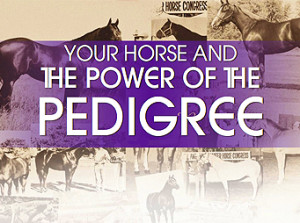Your Horse And The Power Of The Pedigree
Click here to read the complete article478 – October, 2017
BY WILLIAM GIVEN
 Whether you have made the decision to breed your first foal or your next, your decision provides you with a wonderful opportunity to become more knowledgeable about the history of your breed and the make-up of some of your favorite stallions. For those on tight budgets, the mixing and matching of pedigrees on paper is safer and a much more cost effective method than experimenting with your cherished riding companion and champion. Your pedigree research may even be the key that cracks the code and unlocks the secrets that could prove crucial to future breedings that just might create a new dynasty of equine superiority.
Whether you have made the decision to breed your first foal or your next, your decision provides you with a wonderful opportunity to become more knowledgeable about the history of your breed and the make-up of some of your favorite stallions. For those on tight budgets, the mixing and matching of pedigrees on paper is safer and a much more cost effective method than experimenting with your cherished riding companion and champion. Your pedigree research may even be the key that cracks the code and unlocks the secrets that could prove crucial to future breedings that just might create a new dynasty of equine superiority.
Many people find the very thought of pedigree analysis enough to send them into a hundred-year sleep. In recent years it has become commonplace to hear people say, disparagingly, that a pedigree is nothing but a list of names that is useless as a tool for comparison between individuals and bloodlines. To breed and raise show horses, their reasoning goes, it is far more productive to consider phenotype (the scientific way of saying conformation, or the way a horse looks as a result of the combination of inherited genes and the effect of the animal’s environment) than to waste time researching pedigrees. Others maintain the fact that good show horses come in an array of shapes, sizes, colors, and heritages. Yes, the notion leaves me scratching my head in bewilderment.
How on earth can a person make any realistic assessment of the probable inheritance of either a genotype or phenotype without knowing which of the names in a pedigree are responsible for passing on specific traits with any regularity? How many of these horses can be counted on to reproduce their finest qualities consistently through future generations? How many of these superior traits were deliberately selected for, and how many were the result of a lucky brush stroke across the pallet of proven genetic power?
A breeder’s success is directly proportional to his or her ability to produce superior show or performance horses breeding after breeding. A good eye and wonderful instincts as a breeder are certainly important but more is required. And while success does not require obtaining an advanced degree in genetics, it does require a good working knowledge of the prominent lines in your breed and of the overall quality of the foals produced when bred with one another both within and outside of the confines of their individual bloodlines.
Click here to read the complete article478 – October, 2017










